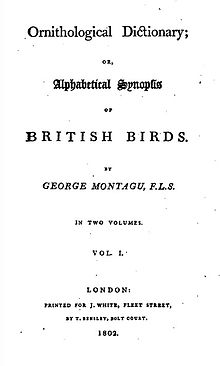Ornithological Dictionary

Title page of first edition
|
|
| Author | George Montagu |
|---|---|
| Country | Great Britain |
| Subject | Ornithology |
| Genre | Natural history |
| Publisher | J. White |
|
Publication date
|
1802 |
| Pages | 717 (two volumes) |
The Ornithological Dictionary; or Alphabetical Synopsis of British Birds was written by the English naturalist and army officer George Montagu, and first published by J. White of Fleet Street, London in 1802.
It was one of the texts, along with Thomas Bewick's contemporaneous A History of British Birds (2 volumes, 1797 and 1804) that made ornithology popular in Britain, and, with the 1676 Ornithologia libri tres of Francis Willughby and John Ray, helped to make it the object of serious study. The book includes a description of the cirl bunting, discovered by Montagu in 1800 near his home in Kingsbridge, Devon.
The first edition was admired by biologists including Charles Darwin and David Lack.
A second edition, extensively revised by James Rennie in 1831, was panned by scientific critics.
The Ornithological Dictionary is George Montagu's best-known work, and the one that established his reputation as a pioneer of British ornithology. He compiled the book at his home Knowle House, near Kingsbridge in Devon. It was published soon after the first volume of Thomas Bewick's illustrated handbook, A History of British Birds, which appeared in 1797. It does not describe what is now called Montagu's harrier, which he separated from the hen harrier in 1803, after the publication of the book.
George Montagu's introduction, "in hopes of advancing knowledge of the subject", mentions Thomas Pennant as being "diffuse on the subject" of ornithology, as well as Dr. Latham's General Synopsis of Birds and his Index Ornithologicus. He then introduces the anatomy of birds, separating those with a cartilaginous stomach or gizzard, and those with a membranous stomach; those that incubate their young, and the cuckoo that does not; with remarks on instincts such as carrying shell fragments away from the nest, birdsong, and feet adapted for different purposes, such as climbing or swimming. Montagu states that the "sheets have been entirely drawn from our own observations, and compiled from the notes of twenty years search and attention ... in most parts of this kingdom", mentioning woods, mountains and "barren waste", rivers and lakes.
...
Wikipedia
